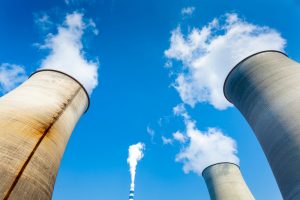The House of Representatives recently voted 216 to 212 to repeal the power plant rule that “prevents facilities previously subject to strict standards for seven hazardous air pollutants under the Clean Air Act (CAA) from being reclassified into a less-strict category of regulation,” according to a Washington Examiner article on MSN News.
No replacement rule has been announced, which is “an unusual move, given that EPA still has a legal obligation to regulate carbon from the highest-emitting sectors. … The agency is under no obligation to repeal and replace the standards at the same time—and EPA has already said it will ‘reconsider’ a 2009 finding that underpins all [CAA] climate rules,” notes E&E News. “If that effort is completed and stands up in court, it could remove EPA’s obligation to write a new power rule.”
In Trump’s first term in office, his administration repealed power plant emissions regulations issued by the Obama administration and released his own Affordable Clean Energy (ACE) rule, which was ultimately vacated through the legal system.
Current power plant rules
In April 2024, the Biden administration finalized four power plant rules to reduce pollution from fossil fuel-fired power plants.
The suite of final rules included:
- A final rule for existing coal-fired and new natural gas-fired power plants to ensure all coal-fired plants that plan to run in the long term and all new baseload gas-fired plants control 90 percent of their carbon pollution;
- A final rule strengthening and updating the Mercury and Air Toxics Standards (MATS) for coal-fired power plants, tightening the emissions standard for toxic metals by 67% and finalizing a 70% reduction in the emissions standard for mercury from existing lignite-fired sources;
- A final rule to reduce pollutants discharged through wastewater from coal-fired power plants by more than 660 million pounds per year, ensuring cleaner water for affected communities, including communities with environmental justice concerns that are disproportionately impacted; and
- A final rule to require the safe management of coal ash that’s placed in areas that were previously unregulated at the federal level, including at previously used disposal areas that may leak and contaminate groundwater.
The bill to repeal the Biden-era rule for existing coal-fired and new natural gas-fired power plants was championed through the Senate by Sen. John Curtis, R-Utah, who put forth the bill under the “Congressional Review Act (CRA), which allows resolutions to pass in both chambers with simple majorities to cancel newly implemented agency rules. Curtis argued that the rule prevents facilities from improving emissions.”
“The rule put forward under the former Administration shut the door on progress. It told companies that no matter how much they invest to reduce harmful emissions, they would still be punished with permanent red tape,” Curtis said in a statement earlier this month.
Why the rush?
The rush to return to more traditional energy sources is because of increased demand for energy by technology endeavors like artificial intelligence (AI) data centers that can’t currently be met through clean energy sources.
The entire suite of Biden-era power plant rules is on the chopping block.
Environmentalists are concerned about rule changes that increase emissions.
When the Trump administration announced its deregulation efforts, part of that announcement was that 68 power plants would be given a two-year exemption from compliance with the MATS, which were designed to create further reductions in mercury emissions.
“CBS News analyzed the Trump administration’s exemptions and found that nearly 65% of these plants are located within three miles of low-income, minority communities,” according to Yahoo News.
“Bottom line is, who’s more at risk are poor people,” said Ben Jealous, executive director of the Sierra Club, an environmental advocacy group that has led an effort to try and close almost two-thirds of the nation’s coal plants. “When you start increasing production of coal-fired power plants, you’re going to kill more people, and you’re going to cause more heart attacks, and you’re going to cause more asthma attacks.”

